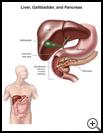
Wilson Disease
________________________________________________________________________
KEY POINTS
- Wilson disease is a rare condition that causes copper to buildup in your body. The buildup of copper can damage or destroy organs and tissue in your body.
- Your healthcare provider may prescribe medicines that help remove the extra copper from your body. You may need a diet that is low in copper.
- Follow your healthcare provider's instructions for taking medicine. Ask your provider if there are activities you should avoid and when you can return to your normal activities.
________________________________________________________________________
What is Wilson disease?
Wilson disease is a rare condition that causes copper to buildup in your body. The buildup of copper can damage or destroy organs and tissue in your body. The buildup of copper can cause:
- Scarring of the liver (cirrhosis), which may cause your liver to stop working
- Problems with the brain and the nerves
- Problems with other organs
What is the cause?
Wilson disease is caused by an inherited problem with the genes.
Genes are in each cell of your body. They contain the information that tells your body how to develop and work. Changes in the genes can be passed from parents to children.
You need a small amount of copper that you get from food. Extra copper is usually removed from the body by the liver and leaves your body in bowel movements. In Wilson disease, the liver stores more copper than what your body needs, which can cause liver damage. Copper also builds up in the brain, the eyes, and in other body tissues and organs.
Wilson disease happens in both men and women in all ethnic groups. It starts in childhood but may not be diagnosed until years later when you start to have symptoms.
What are the symptoms?
Signs and symptoms may include:
- Weakness
- Loss of appetite
- Nausea and vomiting
- Weight loss
- Itching
- Yellowish skin and eyes, dark urine, light-colored bowel movements (jaundice)
- Muscle cramps, uncontrolled movements, or muscle stiffness
- Swelling of hands and feet
- Extra fluid around your waist
- Depression, personality changes, or losing touch with reality (psychosis)
If you are female, you may have problems with menstrual periods or with carrying a pregnancy.
Your healthcare provider may check your eyes and see a brown colored ring near the iris, which is the colored part of your eye.
How is it diagnosed?
Your healthcare provider will ask about your symptoms and medical history and examine you. Tests may include:
- Blood tests
- Urine tests
- A liver biopsy, which is the removal of a small sample of tissue for testing
- Eye tests
- Genetic tests
How is it treated?
The disease can be treated if it is found early, which will help prevent organ damage. Your healthcare provider may prescribe medicines that help remove the extra copper from your body. These medicines are called chelating agents. You may need to take zinc, which helps get rid of extra copper.
Your healthcare provider may prescribe a diet that is low in copper. You may need to avoid certain foods such as:
- Shellfish
- Organ meats
- Nuts
- Chickpeas
- Whole grains
- Chocolate
- Mushrooms
In serious cases where your liver is not working well, you may need a liver transplant.
How can I take care of myself?
- Follow your healthcare provider's instructions for taking medicine.
- Eat a healthy diet according to your provider’s instructions. Ask your healthcare provider if you should avoid certain foods.
- Avoid drinking alcohol.
- Avoid taking medicines that can damage the liver more such as acetaminophen.
- Ask your provider:
- How and when you will get your test results
- If there are activities you should avoid and when you can return to your normal activities
- How to take care of yourself at home
- What symptoms or problems you should watch for and what to do if you have them
- Make sure you know when you should come back for a checkup.
How can I help prevent Wilson disease?
If you have a family history of Wilson disease, you should have tests to see if you have the disease. Early diagnosis and ongoing treatment may help prevent organ damage caused by extra copper.

